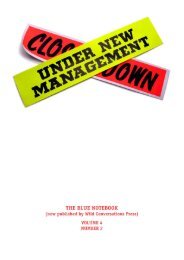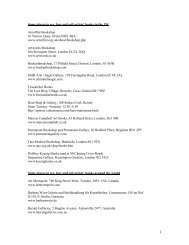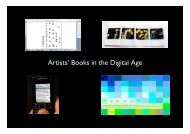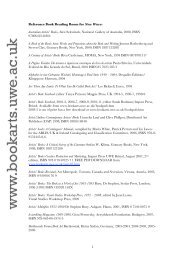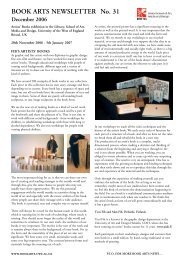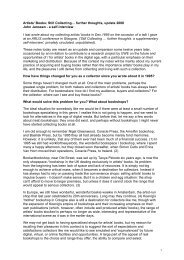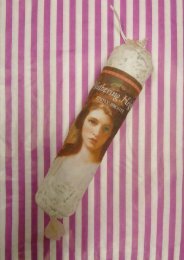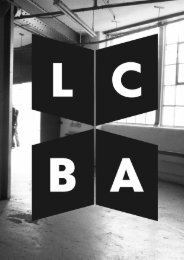Artist's Book Yearbook 2003-2005 - Book Arts - University of the ...
Artist's Book Yearbook 2003-2005 - Book Arts - University of the ...
Artist's Book Yearbook 2003-2005 - Book Arts - University of the ...
Create successful ePaper yourself
Turn your PDF publications into a flip-book with our unique Google optimized e-Paper software.
ARCHIVE: a race against <strong>the</strong> instant?<br />
Chris Taylor<br />
In March 2001 a Regional <strong>Arts</strong> Lottery Project,<br />
Contemporary Artists <strong>Book</strong>s & Related Events, 1<br />
was established providing <strong>the</strong> opportunity to<br />
develop a number <strong>of</strong> research interests related<br />
to artist’s book production. These included <strong>the</strong><br />
Contemporary Artists’ <strong>Book</strong> Fair as a focus for<br />
discussion, exchange and dissemination; a<br />
series <strong>of</strong> public workshops highlighting <strong>the</strong><br />
processes and production values involved in<br />
<strong>the</strong> making <strong>of</strong> such objects; SYMPOSIA, three<br />
round-table events exploring book-related areas<br />
<strong>of</strong> collecting, audio/visual and interpolation;<br />
IMAGE and TEXT, two separate publications<br />
exploring <strong>the</strong> book format/<strong>the</strong> format <strong>of</strong> <strong>the</strong><br />
page and, finally, ARCHIVE, a collection <strong>of</strong><br />
artists’ books, catalogues and documentation.<br />
ARCHIVE is a collection, a history, an<br />
exhibition, a resource. The collection<br />
comprises 55 artists’ books, (57 if you include<br />
<strong>the</strong> three individual items contained within<br />
IMPACT’s Correspondence), purchased primarily<br />
from participants at <strong>the</strong> 2001 and 2002<br />
Contemporary Artists’ <strong>Book</strong> Fairs. 2 It includes a<br />
cross selection <strong>of</strong> artists’ publications produced,<br />
exhibited and available during that specific<br />
period.<br />
The term ‘archive’ can be problematic as a way<br />
<strong>of</strong> labelling a collection <strong>of</strong> contemporary art<br />
works. ‘Archive’ can suggest a past history,<br />
ra<strong>the</strong>r than a reflection <strong>of</strong> <strong>the</strong> contemporary.<br />
In <strong>the</strong> first <strong>of</strong> <strong>the</strong> three SYMPOSIA 3 events held<br />
at <strong>the</strong> Henry Moore Institute, Leeds in <strong>2003</strong>,<br />
Clive Phillpot questioned <strong>the</strong> application <strong>of</strong> <strong>the</strong><br />
term ‘archive’ to artists books.<br />
"It seems to me that for some reason <strong>the</strong> idea<br />
<strong>of</strong> 'archives' got attached to artist's book<br />
collections. I don't really understand why. I'll<br />
read you a definition <strong>of</strong> archives that might<br />
perhaps make you understand why I have a<br />
problem with this:<br />
Archives - Definition 1. Public records <strong>of</strong> selected<br />
materials kept in a recognised archival repository.<br />
And 2. The accumulation <strong>of</strong> original records<br />
assembled in <strong>the</strong> course <strong>of</strong> activities <strong>of</strong> a person or<br />
91<br />
persons or <strong>of</strong> a public or private institution, etc. etc.<br />
(Librarian’s Glossary)<br />
“So archives, some people say, are <strong>the</strong> memory<br />
<strong>of</strong> an organisation, or in some cases something<br />
to do with <strong>the</strong> life <strong>of</strong> a person. Yet, in popular<br />
parlance, <strong>the</strong> word 'archive' is <strong>of</strong>ten applied to<br />
collections <strong>of</strong> things, an archive <strong>of</strong> bird's eggs<br />
or something, and it seems to be inappropriate.<br />
So, I'll just say that I do have problems with <strong>the</strong><br />
word ‘archive’ attached to artists’ books but it's<br />
one <strong>of</strong> those things like <strong>the</strong> phrase "artist's<br />
books" itself, which won't go away, and that's<br />
not very satisfactory ei<strong>the</strong>r.<br />
However, this archive is not only a history, but a<br />
snapshot <strong>of</strong> contemporary practice in which<br />
<strong>the</strong> genre <strong>of</strong> artists’ books is explored,<br />
discussed and disseminated to both dedicated<br />
and new audiences. ARCHIVE is a living history,<br />
an accessible and tangible resource made<br />
available as a portable exhibition. As Victoria<br />
Worsely, Archivist at <strong>the</strong> Henry Moore Institute<br />
noted,<br />
“Archives are <strong>of</strong>ten seen as dark spaces,<br />
stereotypically located in <strong>the</strong> basement, and this<br />
space signifies a burial or entombment <strong>of</strong><br />
things past. In archival <strong>the</strong>ory, all information<br />
produced fits into what is called <strong>the</strong> ‘life cycle<br />
<strong>of</strong> <strong>the</strong> record’. When it is created and being<br />
used by its creator, it is termed a ‘current<br />
record’. When its active life is over, but it is still<br />
used occasionally, it becomes ‘semi-current’ as a<br />
record that isn’t needed all <strong>of</strong> <strong>the</strong> time but may<br />
occasionally be referred to. And only when it<br />
has no use in <strong>the</strong> present by its creator and is<br />
determined as valuable enough to keep for<br />
posterity does it take on <strong>the</strong> attributes <strong>of</strong> an<br />
archival record. Archives, because <strong>the</strong>y<br />
normally begin at <strong>the</strong> end, are <strong>the</strong>refore<br />
inextricably linked with <strong>the</strong> notion <strong>of</strong> death.” 4<br />
Usually, collections <strong>of</strong> whatever type are<br />
acquired and grow until every item that could<br />
possibly belong within <strong>the</strong>m have been<br />
collected, <strong>the</strong> collector loses interest or <strong>the</strong><br />
collector dies. ARCHIVE never had <strong>the</strong> luxury<br />
<strong>of</strong> endless funds, but was defined from <strong>the</strong> very<br />
beginning by a set budget, a decision to<br />
incorporate a diverse range <strong>of</strong> production<br />
techniques and, most importantly, to highlight<br />
<strong>the</strong> array <strong>of</strong> conceptual experimentation




